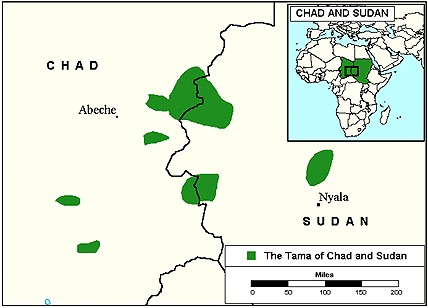The Kibet people live in east-central Chad and western Sudan. They are a subgroup of the larger Tama speaking peoples. The Kibet language is a dialect of Tama. Most Kibet also speak Chadian Arabic, the primary trade language of the country. Most Kibet live in and roam in the Sahel, the middle section of Chad. This region receives sporadic rainfall. Droughts are common during which the Kibet can face starvation. Life expectancy among the Kibet people is about 50 years.
The two principal occupations of the Kibet people are herding and subsistence agriculture. Kibet men take care of and protect herds of camels, cattle and goats. There are frequent fights between clans and with other clans. Women work in the home, care for children and engage in limited farming. Dates and millet are the chief crops, along with vegetables like okra and onions. Because of the turbulence and impoverished economy, only about 40% of the boys attend school. The Kibet has an oral culture with less than half of the population being able to read and write. Most boys and girls work full time tending to their family's animals and farming the land. Only about half of the Kibet have access to clean drinking water. Even fewer have electricity and modern medical care.
Large families are common with children, especially boys, seen as a blessing from Allah. Children have the duty of providing for their parents when they get older. Extended families live together. The oldest male is the chief elder or leader of the family. He deals with outsiders and makes judicial decisions. Families arrange marriages. A bride's price is paid in livestock to the family of the young women.
Most Kibet are Sunni Muslims. Their brand of Islam is mixed with animism and folk religion. Sunnis try to obey the teachings of the Koran and the prophet Mohammad. Sunnis believe that by following the Five Pillars of Islam that they will attain heaven when they die. However, Allah, the supreme God of the universe, determines who enters paradise. Sunnis pray five times a day facing Mecca. They fast the month of Ramadan. They attend mosque services on Friday. If a Muslim has the means, he or she will make a pilgrimage to Mecca once in his or her lifetime. Muslims must not drink alcohol, eat pork, gamble, steal, deceive, slander or make idols.
The two major holidays for Sunni Muslims are Eid al Fitr, the breaking of the monthly fast, and Eid al Adha, the celebration of Abraham's willingness to sacrifice his son to Allah. There are few, if any, followers of Christ among the Kibet.
The Kibet have huge physical and spiritual needs. Christian educators and medical teams can show the Kibet the love of God while tending to the physical needs. Workers can drill wells to provide the Kibet with a regular source of clean water. Most of all, the Kibet need to hear the good news of Jesus Christ. He alone can forgive their sins and grant them eternal life.
Pray for a just and lasting peace in Chad.
Ask the Lord to send laborers into Sudan and Chad to share the gospel with the Kibet.
Pray that Christian teachers will be able to start schools among the Kibet.
Ask the Lord to provide for the translation of the Bible and Christian material into the Kibet dialect.
Ask the Lord to produce a network of growing biblical churches among the Kibet.
Scripture Prayers for the Kibet in Chad.
https://minorityrights.org/country/chad/
https://www.hrw.org/reports/2007/chad0107/11.htm
| Profile Source: Joshua Project |











